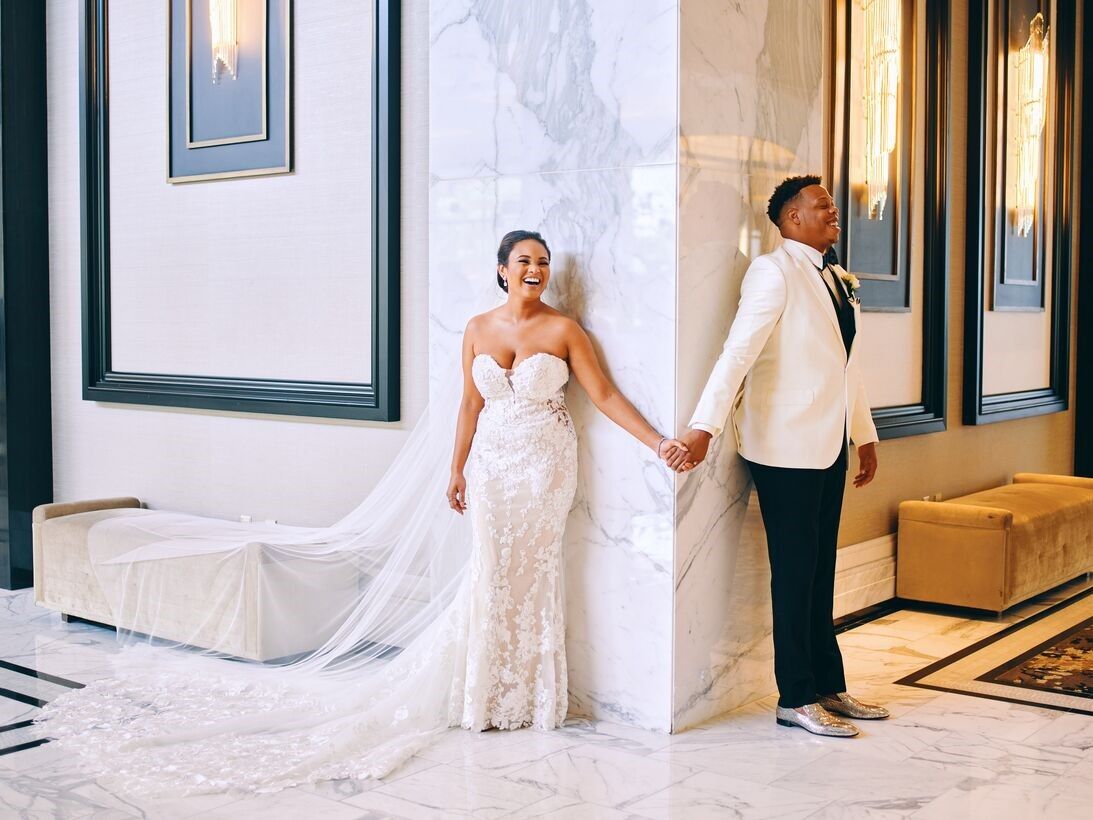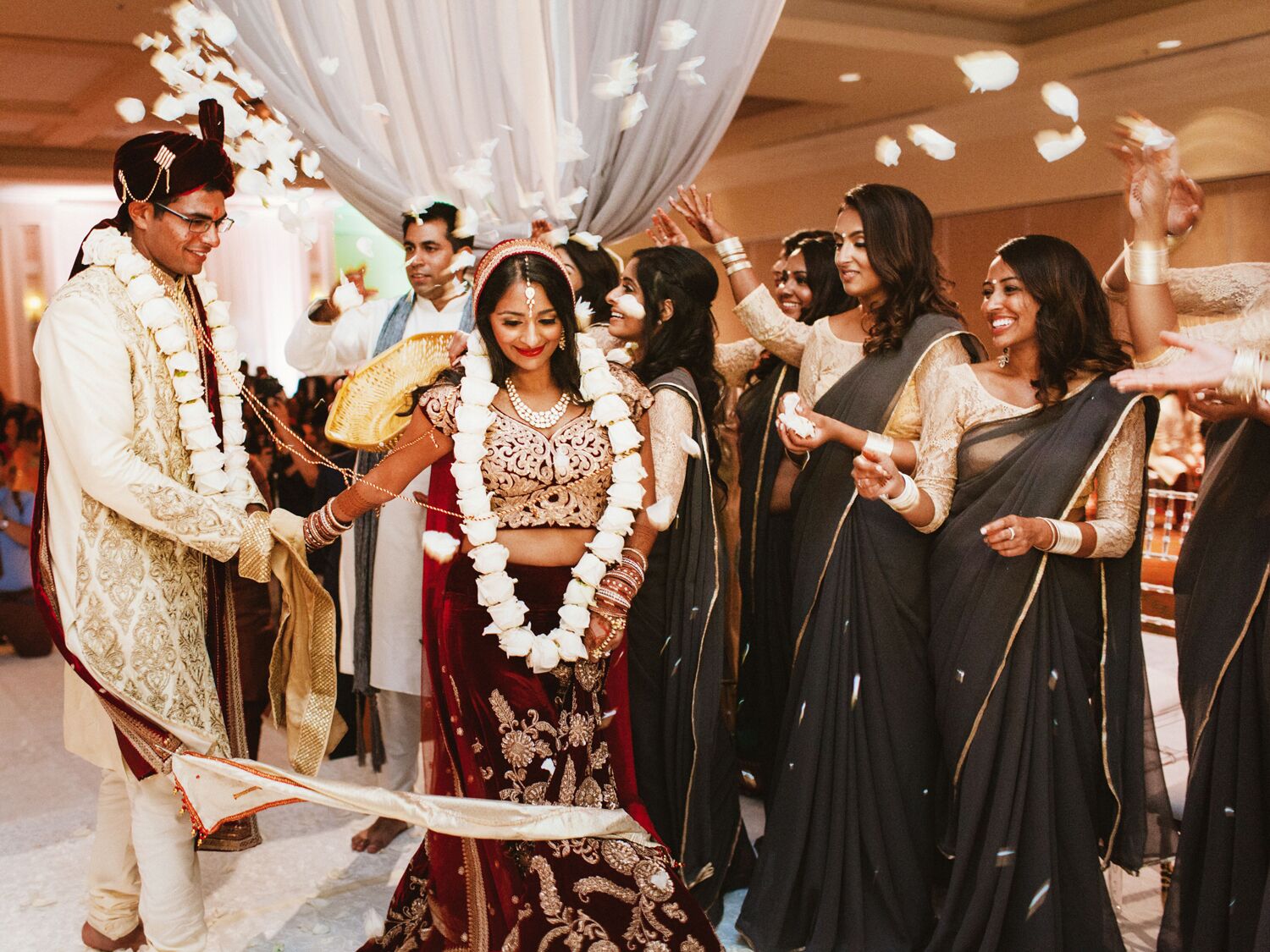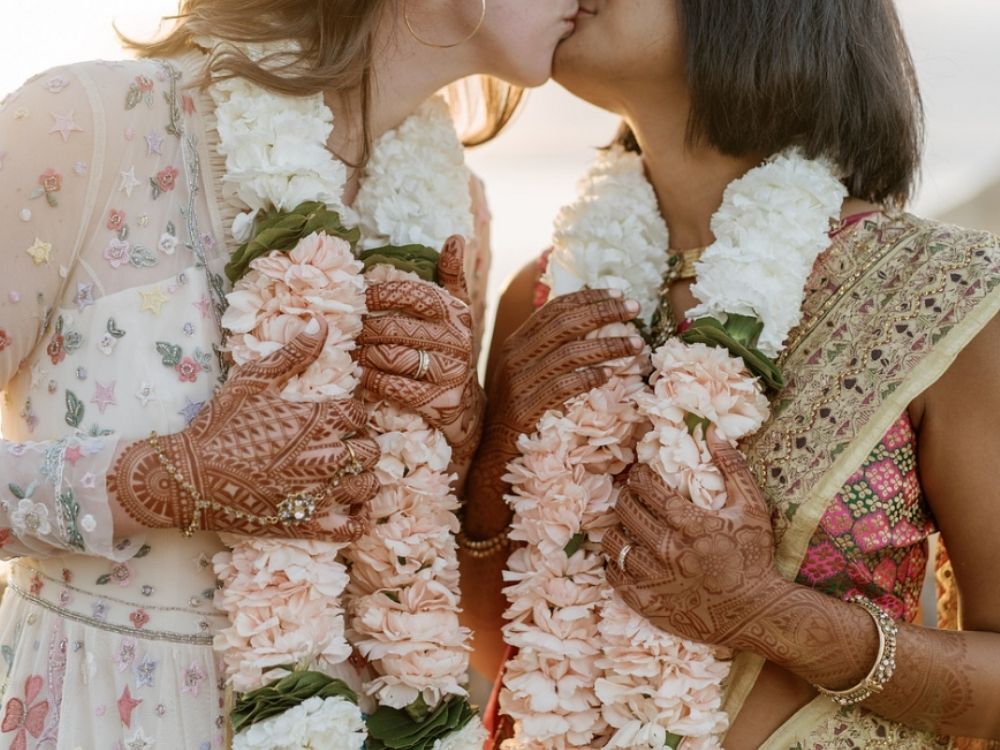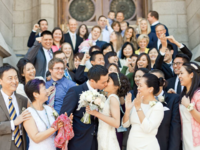Here's Why Traditional Wedding Vows Like "Obey" Should Be Given the Boot

Sharing your sweet nothings about your partner in front of your loved ones or in private isn't a small feat since you want to show your appreciation and love the right way. In some vow templates, you'll find traditional wedding vows like "obey" and think you must include this in your marital oath, but that isn't the case. (That's right—you don't need to obey your partner for them to feel loved and cherished.) Instead, consider having a conversation with your officiant and your soon-to-be spouse about the message you want to present and the best way you can express yourselves as an equal partnership.
So, if you're wondering how the honor and obey wedding vows came to be, what romantic alternatives there are and how to write your own feminist wedding vows, keep reading to get trusted advice from two of our favorite wedding officiants. (Bonus: You can find them on The Knot Vendor Marketplace when you're done.)
In this article:
- What Are the Seven Traditional Wedding Vows?
- Origin of the Word, "Obey" in Vows
- Do You Have to Say "Obey" in Wedding Vows?
- Why You Should Exclude "Obey" from Your Vows
- How to Write Feminist Wedding Vows
- Feminist Wedding Vow Examples
What Are the Seven Traditional Wedding Vows?
Not everyone knows this, but the traditional wedding vows with obey are only spoken by the bride to the groom (big yikes). Here's a breakdown of one of the versions of this classic vow:
I, [Bride's Name], take thee, [Groom's Name], to be my wedded Husband, to have and to hold from this day forward, for better for worse, for richer for poorer, in sickness and in health, to love, cherish, and to obey, till death us do part, according to God's holy ordinance; and thereto I give thee my troth.
Origin of the Word, "Obey" in Vows
Michelle LaBuwi, a professional Wedding Ceremony Consultant and Officiant of Swoon Union, tells us how the honor and obey wedding vows came to be. "It's my understanding that the use of 'obey' in traditional vows is as old as the Roman Empire. Just kidding, kind of. [The vow was] rooted in biblical readings (Ephesians 5:21-24, to be specific) and historical records indicate that starting in the 1500s, the Church of England usually offered couples a choice: they could vow to 'love and cherish' one another, or the groom could promise to 'love, cherish, and worship,' while the bride could vow to 'love, cherish, and obey.'" (If you're curious what the Ephesians scripture said, it reads as such: "Submit to one another out of reverence for Christ. Wives, submit yourselves to your own husbands as you do to the Lord. For the husband is the head of the wife as Christ is the head of the church, his body, of which he is the Savior. Now as the church submits to Christ, so also wives should submit to their husbands in everything.")
The love, honor and obey wedding vows were eventually changed during the 1920s because of the Women's Suffrage movement, which urged couples and religious authorities to get rid of the "obey" term. "The Episcopal Church voted to remove the word 'obey' from the bride's section of wedding vows in 1922," LaBuwi says. Overall, the term is still present in some religious ceremonies but isn't as widely used as it was in the past.
Do You Have to Say "Obey" in Wedding Vows?
Tirzah Stein, an Officiant, Wedding Coach and Owner of NearlyWed Coaching, says that having the traditional wedding vows with honor and obey isn't a requirement. "None of the nearlyweds I work with have requested adding the word 'obey' to their wedding ceremony. I always ask folks what they don't want in their ceremony, and I often hear that they don't want any language that indicates a power dynamic, one partner being submissive to the other or overly gendered messaging and wording."
LaBuwi talks about her real-life encounters with to-be-weds as well. "In my experience, couples want their weddings to be anything but basic, overly formal or outdated. Helping them create a super-personalized ceremony that celebrates the essence of their relationship and honors who they are means they get a one-of-a-kind ceremony that lets their love story, values, intentions and dreams shine—without any of the 'ick,' you might find in ceremonies of the past."



If you like how the classic wedding vows sound without "obey," try this version instead:
I, [Your Name], take you, [Partner's Name], to be my [husband or wife]. I promise to be true to you in good times and in bad, in sickness and in health and to love and cherish you for as long as I live.
Why You Should Exclude "Obey" from Your Vows
When you truly analyze the use of "obey" in the famous wedding vow, one can see how it pushes engaged couples, specifically ones of the opposite sex, to acknowledge a male hierarchy in the relationship. Instead of accepting these outdated terms and conditions, we suggest all to-be-weds make their wedding vows unique and be a reflection of their union. But don't just take our word for it. Read the opinions of our officiant experts, who are well-versed in the language of love.
"Full transparency, I don't support the word 'obey.' In my opinion, it sends the message that one person in the relationship, (typically in heteronormative dynamics, the female-identified person obeying the male-identified person) is submissive to the other. For some, this has a religious connection, and that may be something they believe in, which is fine. I just know I wouldn't be the right officiant for them. I believe that marriage is the commitment of two people entering into an equal lifelong partnership, it's not that one has more leadership, control and power than the other," Stein explains.
"[If I could describe the wedding vow] in one word [it would be] 'cringe.' Honestly, it makes me uncomfortable. As someone who believes in equality in marriage (and marriage equality), I believe the use of 'obey' is antiquated and toxic and doesn't reflect the majority of modern couples' beliefs about weddings, marriage and long-term committed partnerships," LaBuwi states.
How to Write Feminist Wedding Vows
Your wedding vows should feel natural to you and your partner, not something you feel obligated to say because of tradition. Take out the gendered language and edit your words to be memorable and special. Stein explains how she helps happy couples write feminist wedding vows before the big day. "I help nearlyweds put intentional time and thought into the words they choose, the vows they speak and what elements they incorporate into their ceremony. What feels most important to me in the ceremony creation process is doing what they feel aligned with and having the freedom to break free of tradition and the 'norm' of what society has historically said a wedding should be. A ceremony can look so many different ways because no two relationships are the same. The ceremony is an expression of their one-of-a-kind, unique and beautiful commitment and love. That's what should be the heartbeat of any ceremony."
When you're sitting down to craft your vows, LaBuwi wants you to remember this: "I believe in love, and love holds tremendous power. It is not possessive, and it does not demand obedience. True love is respectful and offers freedom and acceptance—the opposite of obedience." If you don't know how to start writing your wedding vows, speak with your officiant so you can get all the best tips and guidance for your celebration.
Feminist Wedding Vow Examples
Writing feminist wedding vows isn't more difficult than writing traditional ones. Look at the three modern alternatives below, created by LaBuwi, for inspiration.
Show your support for your partner.
Today, I, [Your Name], promise to listen to you, and learn from you, encourage and inspire you, and always support you.
Make a promise to love them forever.
I promise to accept, love, honor and cherish you for the [man/woman/person] you are today and the [man/woman/person] you have yet to become.
Speak about your relationship goals.
[Your Partner's Name], I promise to respect and celebrate our differences, validate your feelings and affirm your experiences with empathy and understanding.




















